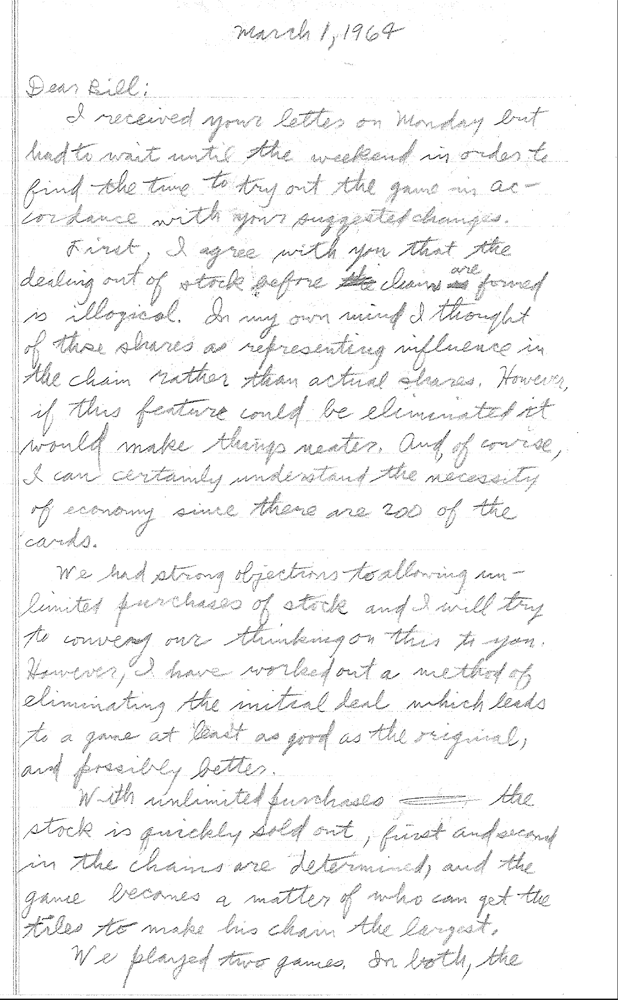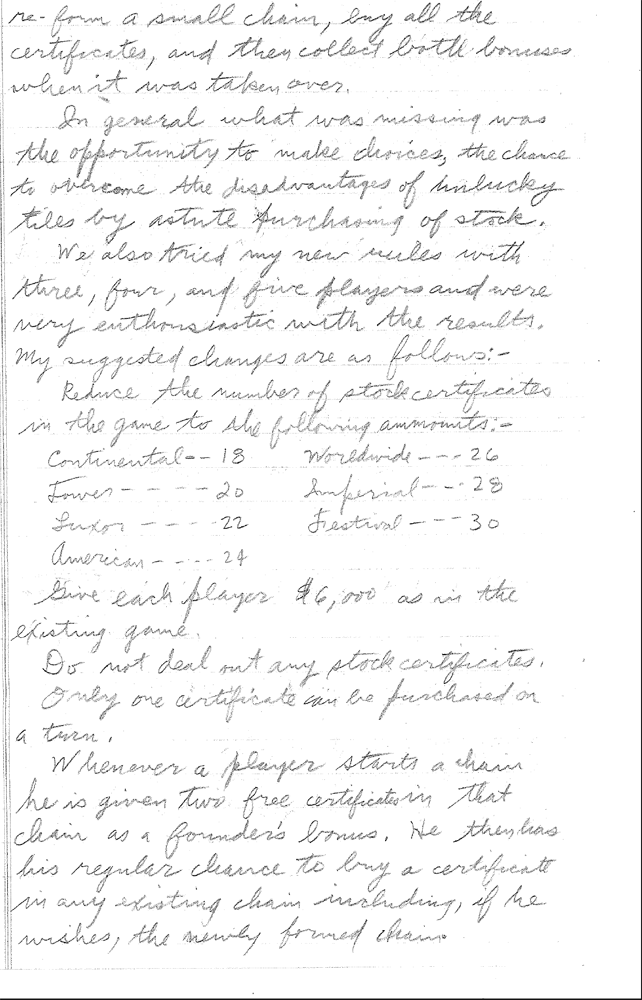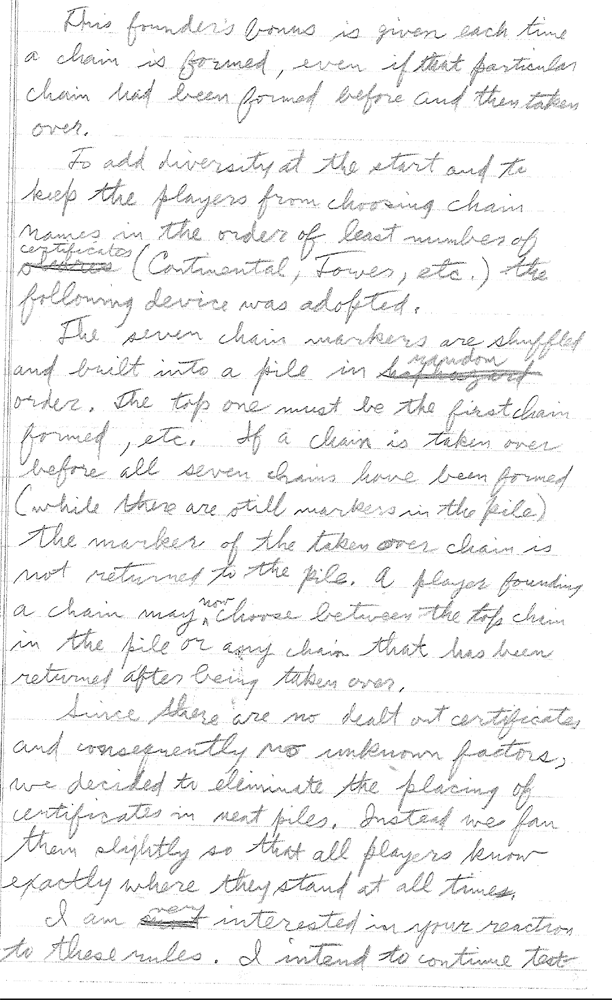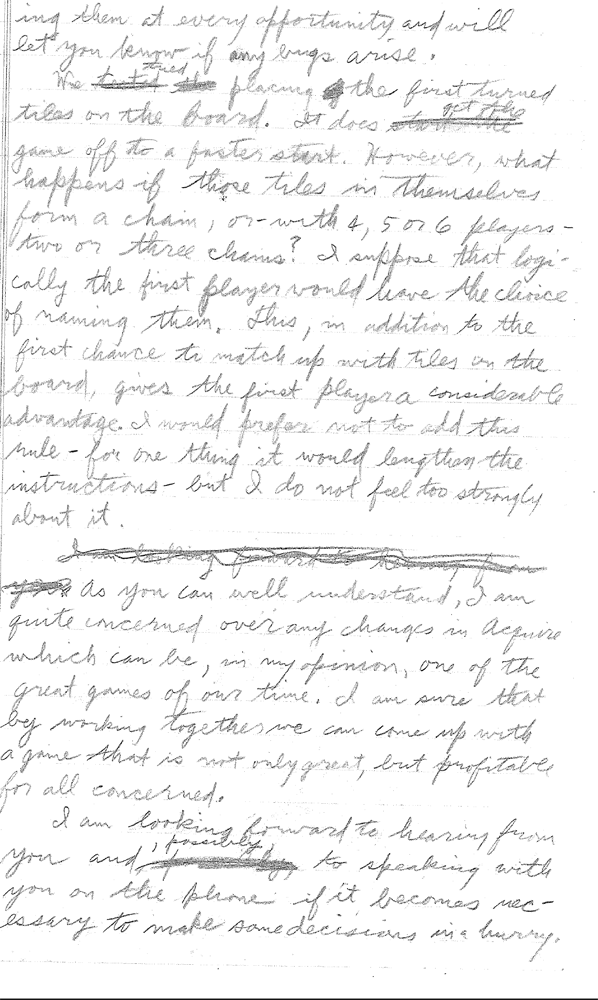The Origin of the Game of ACQUIRE - Part VI: March 1, 1964
Article Index
The next day, March 1st, Sid wrote a letter to Caruson. He wanted to give his feedback on the various editions that 3M had sent, but mainly he wanted to sell the new ideas he had developed within the last two months.
“First of all I agree with you that the dealing out of stocks before the chains are formed is illogical. In my own mind I thought of these shares as representing influence in the chain rather than actual shares. However, if this feature could be eliminated it would make things neater, and of course, I can certainly understand the necessity of economy since there are 200 of the cards.”
Sid was losing his ability to create mystery in the game and 3M simply just wanted to create inexpensive game pieces.
“We had strong objections to allowing unlimited purchases of stock and I will try and convey our thinking on this to you. However, I have worked out a method of eliminating the initial deal which leads to a game at least as good as the original, and possibly better. In general what was missing was the opportunity to make choices, the chance to overcome the disadvantages of unlucky tiles by astute purchasing of stock.”
In this last statement resides the crux of the question of will ACQUIRE be a “good” game or will it be a “great” game? Sid was trying to make it a great game, while 3M was trying to make it a good game. Sid’s ideas and suggestions were based on the aspect of fairness to all players in the game, while 3M was more concerned about economies of scale.
It was at this point, in the history of the game of ACQUIRE, that expediency of time to get the product to the market did not allow adequate time for thoughtful thinking. Sid’s idea of distributing stock at the beginning of the game was his way of giving the players “the opportunity to make choices, and the chance to overcome the disadvantages of unlucky tiles by astute purchasing of stock.” Sid was concerned about keeping the game fair.
It would appear, looking at the makeup of Sid’s original idea, that the necessity of dealing stocks at the beginning of the game was predicated on balancing the practice that players are essentially “given” stocks at the time of merging chains. Sid and Caruson both agreed that giving out stocks before companies are formed is illogical.
They should have then realized that giving out stocks to a vanquished company, which in some cases allows them to assume majority in the conquering company, is also illogical. Without the balance of the free shares distributed in the beginning of the game, then the rule that allows players to trade stocks from the vanquished chain 2 for 1 in the conquering chain increases the “disadvantages of unlucky tiles” and also hampers “the opportunity to make wise choices.”
These two issues were paramount in Sid's mind to create a great game. It seems plausible that Sid initially envisioned that the 2-for-1 rule would give the players a semblance of the stock market by giving them the ability to trade stocks. Yet this rule often ends up in giving a player an unrealistic, and lucky, way of gaining control of the game. By simply eliminating the 2-for-1 rule, Sid would have eliminated his need to distribute stocks at the beginning of the game or even now to try and conceive the practice of “bonus” stocks."
There were other realistic methods that could have been created to trade stocks during game play other than the 2-for-1 rule. Time was not being allowed for deep thinking of game play when production costs became important, and this exercise in game creation had gone beyond 3M wanting strong input from Sid.
In his letter, Sid again addresses his distaste for the loss of mystery in his game while trying all the different variants, even though the changes by 3M are inevitable.
“Since there are no dealt out certificates and consequently no unknown factors, we decided to eliminate the placing of certificates in neat piles. Instead we fan them slightly so that all players know exactly where they stand at all times.”
While Sid was trying his different ideas to balance the game, he toyed with the idea of giving founding shares for opening chains. He still wanted to maintain his original idea of only purchasing one share per turn, even though players would not start with a hand of stocks.
He proceeded to write, “Whenever a player starts a chain he is given 2 free certificates in that chain as a founder’s bonus.”
Yet by adding this feature, he felt he needed to adjust how the chains were opened. He felt there was a certain advantage to opening one chain over another when they had staggered amounts of stock. So he also proposed a way to shuffle the chains and force the players to open certain chains in order.
Every change in the original idea created consequences in other directions. This was evident in another change that 3M wanted to make. Sid continued to write:
“We tried placing the first turned tiles on the board. It does get the game off to a faster start. However, what happens if those tiles in themselves form a chain, or with 4,5, or 6 players – two or three chains? I suppose that logically the first player would have the choice of naming them. Thus, in addition to the first chance to match up with tiles on the board, gives the first player a considerable advantage.”
Sid felt it was just better to put the tiles back in the pile, but this is still a debated topic in the game.
By the end of the letter it appears that Sid feels exhausted.
“As you can well understand, I am quite concerned over any changes in ACQUIRE which can be, in my opinion, one of the great games of our time. I am sure that by working together we can not only come up with a game that is great, but profitable, for all concerned. I look forward to hearing from you and possibly speaking to you on the phone if it becomes necessary to make decisions in a hurry.”
Sid could sense the specter of the corporate influence on his game.



